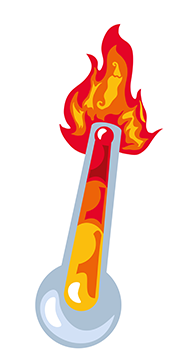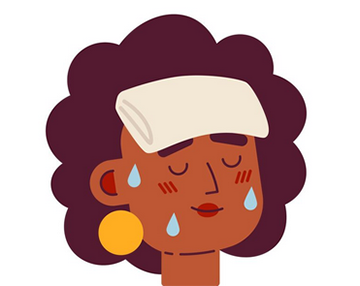Dear Friend,
When I was about nine, my family didn’t have air conditioning in Minnesota. On hot summer evenings, we’d hop in the car with windows open and let the breeze blow through to cool us off. Thinking about pollutants and wasting gasoline weren’t things my parents thought about.
Years later, I visited family in the Seattle area during a rare temperature hike. It went up to 100 degrees! No one seemed to know what to do, so we headed to their superstore and bought fans. With a run on fans in the unusually hot weather, I think we purchased the last fans in the store!
Just what is “hot?”

If someone is “hot,” they’re attractive. If the oven is hot, it does the job, but the heat can damage humans. (I know because I keep a supply of aloe handy to combat burns.)
And in romance, the level of “heat” tells you what to expect in the book’s handling of interpersonal and sexual relationships. Some terms seem ambiguous. What separates a “steamy” book like mine from a “spicy” book that’s supposed to be a notch higher in “heat?” I’m not always sure.
Heat is relative. Here’s an example:
When I lived in upstate New York, I’d been there for over ten years. Going out without a coat when the temperature was between 60 and 70 degrees didn’t bother me. Accustomed to that temperature range, I wasn’t cold at all. When family and friends visited from Florida, they were shivering in that temperature range, wearing coats or sweaters, and looking at us as if they thought we were crazy.
Since I’m here in Arizona for over 20 years, I laugh when I notice people in short sleeves, shorts, and flip-flops at temperatures below 70-degrees. Frankly, since we spend over half the year with temperatures in the 80-to-115-degree range, when it gets below 70, I’m cold. It’s relative. I’m comfortable when my relatives from cooler climates think it’s hot.
To understand how we handle heat in the above contexts, I’ll be talking about air conditioning, the contradictions of “HOT,” describing people with terms like “hot,” and heat in romance.
How air conditioning works
I think that whoever invented air conditioning should have received a Nobel Peace Prize! Having a working A/C system allows people to function better and cope with stress better, thus allowing people to be more peaceful.
According to descriptions on how A/Cs work, the air conditioning we take for granted involves physical properties, like liquid changing to gas, removing humidity by passing hot air over coils with refrigerants, and constantly starting the cycle over. (I’m not going to explain thermostats, which govern how the system will work.) The “how stuff works” website explains things simply. Feel free to read the details, if you wish.
I’m just happy it all works. On the few occasions when our A/C stopped working and needed replacing, we spent time in the library, the supermarket, the gym, and ultimately, checked into a hotel, when it took more than a day to get the parts to replace the system.
The contradictions of HOT
Hot can mean positive, but also negative things. (It reminds me of when the word “bad” could have both a positive and negative connotation. Someone could be called “bad” when it meant good things-people were sharp, etc. It also meant negative connotations.)
Hot stoves can burn. Not a good thing when it’s your skin or a meal you’re trying to prepare.
But when someone says, “Feel the burn,” they’re talking about something that’s considered good. In this meaning, it’s when you’re exercising, and you feel the sting. The converse is when someone’s burned, meaning cheated.
Feeling the heat of Romance
You know them the first time they’re described. The first time they enter a room. They are the HOT characters of romance. For instance, here’s the first time Louisa describes Will, the main male character of Louisa’s Passion:
“I met the owner’s son. He didn’t impress me.”
“Why’s that?” John, Louisa’s father, asks.
“He was rude! . . . I’ve never met anyone like him before. . . “
“Will Watson is tall, well-dressed, a little older than me, I think. He’s muscular, with wavy black hair and hazel eyes.”
Louisa’s brother teases her.
“Gee, you seem to know a lot about him to notice all of that in such a short time. Do you like him, Sis?” Randy asks. His mouth quirked up, and he winked mischievously.

And it turns out Louisa can never forget him. She won’t go out with him when he asks her, but she can’t forget him.
When the main male character smiles, winks, or stares intently at the lead, sparks are going to fly!
When things escalate, relationships often become incendiary! Sometimes, the characters don’t even need to touch. If they touch, even lightly, the relationship may explode to love, lust, or an unforgettable love scene.
I admit I love writing those scenes, drawing out the waiting until readers might be yelling, “Kiss him already!”
Sorry to torment you, but that’s part of upping the heat. Writers create the heat, bit-by-bit, so the reader can enjoy the anticipation. When the couple finally gets together, the pleasure is even more palpable.
Movies and other visual mediums allow viewers to see the action, so the subtlety of relationships can be emphasized with intense close-ups, or simply with a camera that follows a longing glance.
Writers work with a reader’s imagination to increase the heat, the passion, the senses. I hope you enjoy the characters in all of your reading. Sometimes you may dislike them, but eventually they’ll win you over!

PROGRESS ON BOOK 4, THE GREATEST THING
Louisa and Will are confronting their challenges and enjoying the people in their lives! I’m wrapping up the many threads with at least one more couple getting together. I hope to have the book wrapped up in the next month. (But editing, BETA reading, cover design, and printing come after that.)
Can’t wait to share!
Hugs – stay cool –


